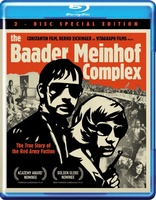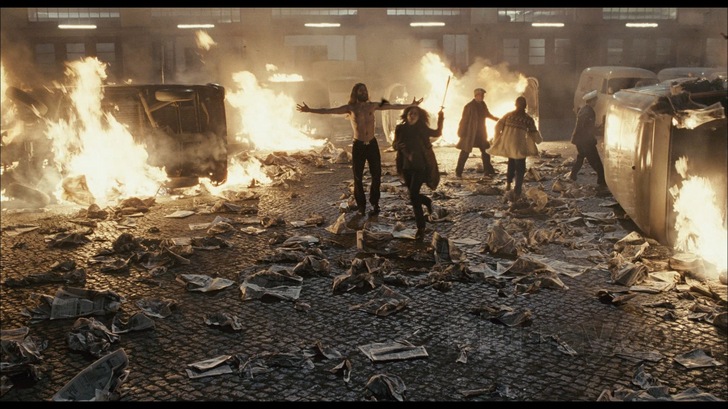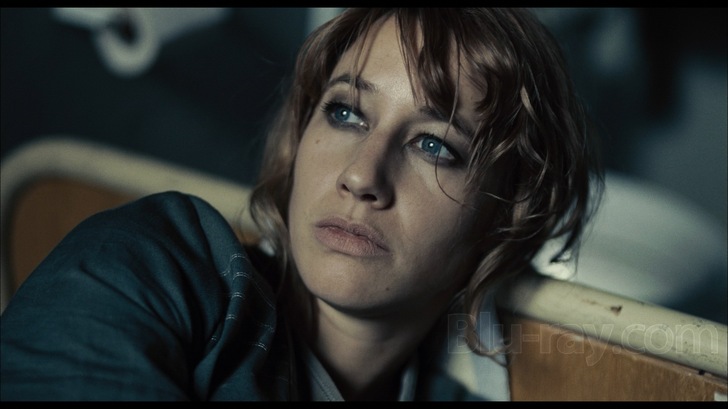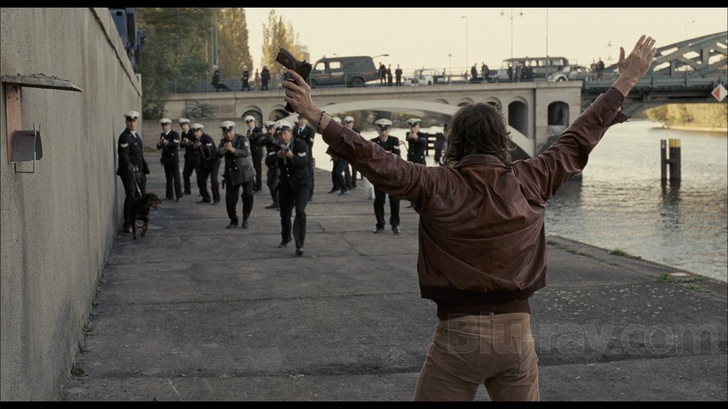The Baader Meinhof Complex Blu-ray Movie
HomeThe Baader Meinhof Complex Blu-ray Movie 
Der Baader Meinhof KomplexMPI Media Group | 2008 | 150 min | Rated R | Mar 30, 2010

Price
List price:Amazon: $27.95 (Save 20%)
Third party: $24.99 (Save 29%)
In Stock
Buy it from YesAsia:
Movie rating
7.4 | / 10 |
Blu-ray rating
| Users | 4.6 | |
| Reviewer | 4.5 | |
| Overall | 4.5 |
Overview
The Baader Meinhof Complex (2008)
Set in Germany, chronicles the rise and fall of the Red Army Faction, postwar Western Germany's most active terrorism organization, also known as the Baader-Meinhof Group.
Starring: Martina Gedeck, Moritz Bleibtreu, Johanna Wokalek, Nadja Uhl, Stipe ErcegDirector: Uli Edel
| Drama | 100% |
| Foreign | 96% |
| History | 60% |
| Biography | 43% |
| Crime | 15% |
| Action | Insignificant |
Specifications
Video
Video codec: VC-1
Video resolution: 1080p
Aspect ratio: 1.85:1
Original aspect ratio: 1.85:1
Audio
German: DTS-HD Master Audio 5.1 (48kHz, 24-bit)
German: DTS-HD Master Audio 2.0
Subtitles
English
Discs
50GB Blu-ray Disc
Two-disc set (1 BD, 1 DVD)
Playback
Region A, B (C untested)
Review
Rating summary
| Movie | 4.5 | |
| Video | 4.5 | |
| Audio | 4.0 | |
| Extras | 4.0 | |
| Overall | 4.5 |
The Baader Meinhof Complex Blu-ray Movie Review
“There’s no use in praying for a better world.”
Reviewed by Casey Broadwater April 2, 2010De-romanticize Bonnie and Clyde, add Che’s radical philosophizing, toss in the verite docudrama of Battle of Algiers, and then, for good measure, mix it all with the prison ward bleakness of Steve McQueen’s Hunger, and you have The Baader Meinhof Complex, a terrific socio-political thriller that reenacts the rise and fall of the Red Army Faction, an extreme left wing “urban guerilla” group that terrorized West Germany in the 1970s. While stateside hippies were flashing peace signs and making love—perhaps hoping the horrors of Vietnam would dissipate like a marijuana haze—the RAF railed against so-called American imperialism, torching department stores, robbing banks, and bombing U.S. military bases in Germany. They saw the West German government as a lackey for American aggression in southeast Asia, and aimed to stand up to new forms of fascism, a reaction to the way their parents sat idly by while Nazism took over the country in the 1930s. Directed by Uli Edel and produced by Bernd Eichinger—who co-wrote 2004’s Downfall, the story of Hitler’s last days—The Baader Meinhof Complex is a pitch-perfect period recreation that’s strikingly objective, allowing us to understand the group’s motives but stopping well short of glamorizing their actions.

The revolution will be televised...
Based on journalist Stefan Aust’s non-fiction book of the same name, the film has an ambitious scope, covering enough of the RAF’s history in its 150-minute running time to easily create two, maybe three films. We start with Ulrike Meinhof (Martina Gedeck), a well-respected left-wing journalist who lives a charmed bourgeoisie life with her publisher husband and twin daughters. Her progressive descent into the underground world of terrorism is the focal point of the first act, which initially shows her writing rather polite missives deriding the shah of Iran, reporting on political rallies, and appearing on nightly news programs to defend student protestors. However, Meinhof finds herself increasingly drawn to a group of activists—led by lovers Andreas Baader (Moritz Bleibtreu) and Gudrun Ensslin (Johanna Wokalek)—for whom words simply aren’t enough. “Do you think your theoretical masturbation will change anything?” asks Ensslin, a blond-haired minx with black eyeliner, the Bonnie to Baader’s Clyde. After subversively helping to break Baader out of police custody, Meinhof faces a metaphorical fork-in-the-road decision, concretely represented by an open window. Should she stay behind and feign innocence—that is, continue her life of privilege and typewriter-only activism—or should she follow the RAF gang through the window, giving up her family and her professional respectability for a career as an urban outlaw? Of course, she jumps.
Now fully formed, the Red Army Faction ratchets up the intensity of their actions. After training in Jordan with Palestinian guerillas—who, upon seeing the RAF women sunbathing nude on top of a military compound, seem quite wary of Baader’s insistence that cultural and sexual revolution go hand in hand—the group returns to Germany with an eye on disrupting the system. They “expropriate” money from banks at gunpoint and then go on a bombing spree, targeting judges, prosecutors, right-leaning newspapers, and the U.S. military presence. We’re privy to their arguments and justifications, which grow progressively more circular and rash. Inevitably, they’re hounded down and rounded up—using primitive electronic intelligence—by the head of German police (Bruno Ganz), a levelheaded man who has no sympathy for the terrorists, but does want to figure out what motivates them to do what they do. He’s a voice of reason; he doesn’t want to use the long arm of the law to crush counterculture thought altogether, he just wants to abolish the myth that cyclical violence is going to change anything. He basically seeks to understand the complex of the film’s title, a word with a two-fold meaning here, referring to the psychological state that would allow a person on a perceived moralistic mission to commit blatantly immoral acts—murder, theft, mass destruction—as well as the cultural conditions within Germany that fostered the rise of the RAF and other militant left-wing groups.
Director Uli Edel captures the revolutionary spirit of the times with often alarming realism, using hand-held camerawork to carry us right into the middle of the action. The student protest at the beginning of the film is as intense as anything you’ll see onscreen this year, and the moments of violence that punctuate long stretches of tension are brutal and unflinching. (You might be reminded of A History of Violence when anarchist spokesman Rudi Dutschke takes a bullet to the cheek here—we see the entry wound as it happens, and watch as he stumbles around in a stupor, drooling blood and babbling incoherently.) The last third of the film seems a bit stretched time-wise, with long courtroom proceedings, hunger strikes, and much internal squabbling amongst the jailed Red Army members—who were allowed, almost unbelievably, to convene everyday in a communal area—but things pick back up again when the second generation of RAF activists conspire to get their predecessors out of prison. These newbies are even more vicious, taking over a German embassy, murdering high-ranking officials, and even getting a group of Arab terrorists to hijack a Lufthansa jet, with the intent of using the hostages as bargaining chips to free the RAF leaders. There are a lot of names and faces to keep track of, but in fitting with a film about communist guerillas, the individual stories are not nearly as important as the unfolding of a collective experience.
The Baader Meinhof Complex Blu-ray Movie, Video Quality 

The Baader Meinhof Complex hits hard on Blu-ray with a 1080p, VC-1 encoded transfer that's nearly as striking as the film. I'm really enamored with MPI's presentation here, a sharp, clean look that faithfully represents the film's restrained color scheme, heavy on grays and blues and browns. That's not to say there isn't vibrancy, as revolutionary reds pop brightly and the image proves vividly heightened in many sequences, like when the group goes to the Jordanian desert to train. The picture itself isn't gritty—grain is thin and natural except for a few spikes during darker scenes—but it certainly has a gritty emotional tone, growing increasingly bleaker color-wise as the RAF gradually implodes in prison. Skin tones are fitting with the slightly desaturated overall look, and dark blacks give the image an even-keeled sense of contrast. Clarity is impressive throughout, with close-ups revealing nuanced skin texture and longer shots featuring more than adequate background detail, letting you absorb the particulars of the period art direction. Just as importantly, this is a very strong encode, with no discernable compression-related issues. Likewise, there are no telltale signs of clumsy DNR or overzealous edge enhancement. At no point was I taken out of the experience by any technical shortcomings. Well done!
The Baader Meinhof Complex Blu-ray Movie, Audio Quality 

The film's German language DTS-HD Master Audio 5.1 surround track is just as heavy hitting as the visuals, with strong dynamics and frequently immersive rear channel engagement. Like the film itself, this track has bursts of frenetic, high-octane activity followed by periods of relative calm. During the initial protest scene, screams are heard all around and we're put right in the middle of the madness as a fire hose shoots water directly at the camera, the sound spraying from front to back. Assassinations feature machine gun bullets ripping holes through the soundfield—loudly, I might add—and explosions that ripple outward, sending glass and debris clattering everywhere. It's not the most intense sonic experience you'll hear on Blu-ray this year, but it certainly adds to the impact of the film. During the quieter scenes, slight but appreciable environmental ambience takes over in the rear speakers, while dialogue remains clear and intelligible up front. The disc also includes a capable DTS-HD Master Audio 2.0 mix-down, but if you've got surround capability, you'll definitely want to stick with the 5.1 track. Subtitles appear in crisp, easy-to-read white lettering.
The Baader Meinhof Complex Blu-ray Movie, Special Features and Extras 

Disc One (Blu-ray)
The Making of The Baader Meinhof Complex (1080p, 29:48)
An excellent making-of documentary. "The idea," says director Uli Edel, "was for the audience to
be able to identify with the Baader Meinhof Group, but really only up to a certain point." Here we
get lots of behind-the-scenes footage as well as interviews with just about everyone involved,
including Stefan Aust, the journalist who wrote "The Baader Meinhof Complex" in 1985, who
explains the crux of the real life events: "In truth, it lies at the heart of almost all violent political
movements, in other countries and at other times as well, in that people with an inflated
moralistic sense of their mission completely lose sight of the fact that their own actions are
blatantly immoral." Do note that this documentary—and all of the special features included on
the accompanying DVD—are in German with English subtitles.
Trailer (1080p, 2:14)
Disc Two (DVD)
The remainder of the special features is housed on a DVD. Do note that the DVD does
not contain an additional copy of the film.
The Actors on their Roles (SD, 37:51)
Here, director Uli Edel and all the principal actors from the film discuss the research that went
into the process of slipping into the skin of these real life characters. The interviews are intercut
with scenes from the film and plenty of behind-the-scenes material.
Scoring Baader (SD, 11:56)
Co-composers Peter Hinderthur and Florian Tessloff discuss the complete excitement and utter
fear with which they greeted the project, and explain how they arrived at the tack they decided
to take for the film's orchestral/electronic score.
On Authenticity (SD, 20:40)
From music and costumes, to advertisements, archival footage, and hairstyles that change
realistically over the course of the film, this segment explains the film's utter attention to
detail.
Behind-the-Scenes (SD, 12:59)
They should've just called this segment Uli Edel and Bernd Eichinger, as it prominently features
the director and his producer/co-writer/friend talking about their history together—they met in
the 1960s on the first day of film school—and their own reflections of the time period that the
film covers.
Interview with Author Stefan Aust (SD, 9:03, 19:18, and 13:40)
In this three part interview, author Stefan Aust discusses the importance of Melville's Moby Dick
to the Baader Meinhof organization, reveals his own run-ins with both Baader and Meinhof,
explains the political and cultural climate that resulted in the rise of the Red Army Faction, and
extrapolates on the similarities between the RAF and other terrorist groups.
Interview with Writer/Producer Bernd Eichinger (SD, 10:21 and 14:49)
Here, Eichinger talks about the idea of choosing real life events from a ten-year span to create a
"drama of fragments" that backs off from making any value judgments about the characters,
leaving that for the audience to decide. In the second part of the interview, he discusses his own
reflections of the Germany of the 1960s and 70s presented in the film.
The Baader Meinhof Complex Blu-ray Movie, Overall Score and Recommendation 

Many recent movies have tried to show the human "face" of terrorism, but few have done so as objectively and spectacularly as The Baader Meinhof Complex—a 2008 Academy Award nominee for Best Foreign Language Film—which never sympathizes with the activists or their actions, but does try to understand them and place their subversive movement within the context of the overall cultural turbulence of the 1970s. Highly recommended!
Similar titles
Similar titles you might also like

Mesrine: Public Enemy No. 1
Part 2 / Mesrine: L'ennemi public n°1
2008

Che: Part One
2008

Mesrine: Killer Instinct
Part 1 / Mesrine: l'instinct de mort
2008

Che: Part Two
2008

Of Gods and Men
Des hommes et des dieux
2010

Cesar Chavez
2014

Pioneer
Pionér
2013

Confucius
孔子 / Kong zi
2010

The Conformist
Il Conformista | 4K Restoration
1970

Elite Squad: The Enemy Within
Tropa de Elite 2: O Inimigo Agora É Outro
2010

The Club
El Club
2015

The Battle of Algiers
La battaglia di Algeri
1966

Never Look Away
Werk ohne Autor
2018

J. Edgar
2011

Scum
1979

The Lost Honor of Katharina Blum
Die verlorene Ehre der Katharina Blum
1975

La Femme Nikita 4K
1990

Danton
1983

Hunger
2008

My Way
마이웨이 / Mai Wei
2011